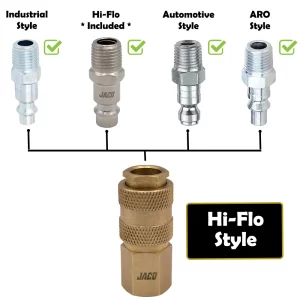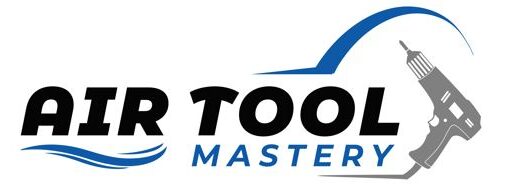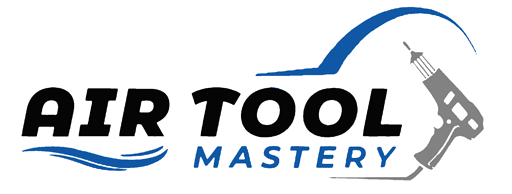Air couplers, also known as quick-connect couplers, are the connection points that allow pneumatic tools to be quickly attached and detached from their air supply. They play a pivotal role in the functionality and efficiency of pneumatic systems, ensuring a safe and secure connection while providing the necessary flexibility for tool interchangeability.
Originating in the early 20th century, air couplers have undergone significant evolution in design, materials, and functionality to meet the growing demands of the industry. Today, air couplers are indispensable in a wide array of applications, from automotive repair to construction, demonstrating their relevance and importance in the pneumatic industry. Let’s delve deeper into the fascinating world of air couplers.
The term ‘air coupler’ is derived from the primary role these components play in pneumatic systems. They ‘couple’ or connect the air supply to the pneumatic tool at hand, facilitating the flow of compressed air. Thus, they are aptly named ‘air couplers’, emphasizing both their operational principle and their fundamental purpose in air-powered applications.
The Mechanism of Air Couplers
Air couplers function through a relatively simple yet effective mechanism. They consist of two primary components: the plug and the socket. The plug is the male component that fits into the socket, the female part. The socket houses a valve that remains closed when there’s no plug inserted, preventing the escape of compressed air.
Ideally, when the plug is inserted into the socket, the valve is opened, enabling the flow of compressed air from the supply to the tool.
Both the plug and socket are typically made of durable materials like steel, brass, or chrome-plated to withstand high pressures and harsh conditions. In addition, they come in different designs (e.g., industrial, automotive, ARO) to suit diverse applications and compatibility requirements.
The role of each part of the air coupler is significant. The plug connects the air hose with the tool, essentially acting as a conduit for the transferred air which powers pneumatic devices.
On the other hand, the socket, with its internal valve, acts as a regulator, controlling the flow of compressed air and ensuring safety by preventing air leakage when the tool is disconnected. Together, these components enable the smooth and efficient operation of pneumatic systems.
The Different Types of Air Couplers

Air couplers come in a variety of styles, each with their unique design, features, and applications. The three most common types used in the industry are the Industrial style, ARO style, and Automotive style. Let’s further explore these different types.
1. Industrial Style
Industrial-style air couplers, also known as M-style or Milton-style couplers, are characterized by their robust and versatile design. They are compatible with a wide range of pneumatic tools and applications, making them a popular choice in the industrial sector. These couplers ensure a secure and leak-free connection, offering a high flow rate for efficient operation.
2. ARO Style
ARO Style air couplers are distinguished by their compact and lightweight design. They are primarily used in ARO pneumatic tools and systems, known for their quick-connect and disconnect capability, providing a seamless workflow. ARO-style couplers are typically used in applications that require a smaller, more precise air supply.
3. Automotive Style
Automotive-style air couplers, often referred to as T-style couplers, are designed specifically for automotive applications. They are widely used in auto repair shops and garages due to their high flow capacity, which is ideal for inflating tires and powering air impact wrenches. These couplers ensure a reliable connection, preventing accidental disconnection during use.
4.Hi-Flo Style
Hi-Flo Style air couplers are designed for high flow applications, offering a large internal diameter to maximize airflow. These couplers are commonly used in heavy-duty pneumatic tools and systems that require a significant amount of air supply. They provide quick-connect and disconnect capability, ensuring efficient operation and reducing downtime.
What Are Air Couplers Made of?
As we already pre-empted, air couplers are typically made of durable materials that can withstand high pressures and frequent use. The most commonly used materials in manufacturing air couplers include brass, steel, aluminum, and plastic.
Brass
Brass is a type of metal alloy made primarily of copper and zinc. It is highly resistant to corrosion, making it a popular material for air couplers. Brass couplers have excellent durability and conductivity, making them suitable for heavy-duty applications.
Steel
Steel is another common material used in the production of air couplers. It offers high strength and durability, making it suitable for heavy-duty industrial applications. Steel couplers are also resistant to corrosion and can withstand high pressures, making them ideal for use in harsh environments.
Aluminum
Aluminum is a lightweight material that offers good strength and durability. It is commonly used in automotive style air couplers due to its ability to resist rust and corrosion. Aluminum couplers are also easy to handle, making them a popular choice among mechanics and DIY enthusiasts.
Plastic
Plastic air couplers are lightweight, cost-effective, and easy to install. They are commonly used in home garages or for light-duty applications. Plastic couplers come in various colors, making it easier to color-code different air tools for efficient organization.
Tips for Choosing the Right Air Coupler for Your Application
Choosing the right air coupler is crucial to ensuring efficient and safe operation. When selecting an air coupler, there are a few key factors to consider:
Compatibility
It is paramount to make sure the coupler is compatible with your specific pneumatic tools and applications. Otherwise, you may risk damaging your tools or experiencing air leaks.
Size
Air couplers come in different sizes, and it is essential to match the proper size to your air compressor. Using a coupler that is too small for your compressor can restrict airflow and reduce efficiency.
Coupling Type
There are two main types of coupling: industrial and automotive. Industrial couplers have a larger profile and are designed for heavy-duty applications, while automotive couplers have a smaller profile and are more suited for light-duty use.
Pressure Rating
Consider the maximum pressure rating of the air coupler to ensure it can handle the pressures generated by your air tools. Using a coupler with a lower pressure rating can lead to air leaks or even cause damage to your tools.
Material
As we mentioned earlier, air couplers come in various materials, each with its own advantages and disadvantages. It is crucial to consider the specific demands of your application when choosing a material for your coupler.
Air Coupler Safety
Potential Risks and Hazards
Misusing or improper coupling can cause air leaks or sudden disconnects, potentially causing injury or damage to both the users and equipment. Overloading an air coupler beyond its pressure rating is also risky as it can lead to failure or explosion, posing a danger to operators and bystanders.
Last but equally crucial, inappropriate material selection can result in premature wear and corrosion, leading to unpredictable failure and possible harm.
Safety Measures and Best Practices
To prevent these hazards, it is crucial to adhere to a few safety measures and best practices. Always ensure the coupler is correctly matched to your tools and application to prevent improper coupling.
Do not exceed the coupler’s pressure rating to avoid overloading. Regularly inspect couplers for signs of wear or damage and replace them as needed. When in doubt, consult with a professional or the manufacturer to verify compatibility and proper use.
Common Issues and Solutions for Air Couplers
Air couplers, like any other equipment, can face a few common issues over time. These issues can vary from leaks to a sudden disconnect of the air coupler. While some of these problems can be solved by the user, others may require professional help.
Two Common DIY Solutions
- Air Leaks: If you notice a hissing sound or a consistent drop in air pressure, it’s likely you have a leak. A quick DIY solution is to check the connections and ensure they’re tightly secured. You can also apply thread sealant to the coupler threads, which can reduce the chance of leaks.
- Unexpected disconnects: This can happen if the coupler is not correctly matched with your tools. Be sure to verify that the coupler and the air tool have the same design or mounting type before coupling them together.
Seeking Professional Help
Despite your best efforts, some air coupler problems might persist or be too complex to handle. In such situations, seeking professional help is recommended. Issues like internal corrosion, wear and tear, or mechanical failures should be addressed by a trained technician or the manufacturer to avoid further damage or potential safety risks. Remember, safety should always be your top priority.
FAQs
How often should I replace my air couplers?
It’s essential to regularly inspect your air couplers for signs of wear or damage and replace them as needed. The frequency of replacement may vary depending on factors such as usage, environmental conditions, and the quality of the coupler.
Can I mix and match different brands of air couplers and tools?
It’s generally not recommended to mix and match different brands of air couplers and tools. Each brand may have its unique design, which could affect the compatibility and performance of the coupler. It’s best to stick with matching brands for optimal results.
What is the best way to clean my air couplers?
Keeping your air couplers clean is crucial for their proper functioning. To clean them, use compressed air to blow out any debris or dirt that may have accumulated inside the coupler. You can also use a small brush and some lubricant to remove any stubborn particles.
Can I use Teflon tape on my air coupler threads?
Yes, you can use Teflon tape on your air coupler threads to ensure a secure and leak-proof connection. However, be careful not to use too much tape as it can cause issues with the coupler’s fit and function.
What should I do if my air coupler is leaking?
If you notice any leakage from your air coupler, first check for any damage or wear on the coupler. If there is none, try tightening the connections and ensuring they are properly aligned. If the issue persists, it’s best to replace the coupler or seek professional assistance.
Why do I need a safety clip for my air couplers?
Safety clips are designed to prevent accidental disconnection of air couplers while in use, which can cause injury or damage. It’s crucial to always use a safety clip when operating air couplers to ensure the safety of yourself and those around you.
Can I use my air coupler for other fluids besides compressed air?
No, air couplers are specifically designed for use with compressed air only. Using them with other fluids can result in damage or malfunction and can also be hazardous. It’s important to use the correct coupler for each specific fluid.
How often should I replace my air couplers?
It’s recommended to replace your air couplers every 2-3 years or sooner if they show signs of wear and tear. Regular maintenance and proper usage can also extend the lifespan of your couplers.
Conclusion
Air couplers are critical components in the safe and efficient operation of pneumatic tools. By understanding their purpose, types, and safety considerations, you can choose the right coupler for your application and use it correctly to prevent accidents and prolong its lifespan. Remember to always prioritize safety when working with air couplers.

